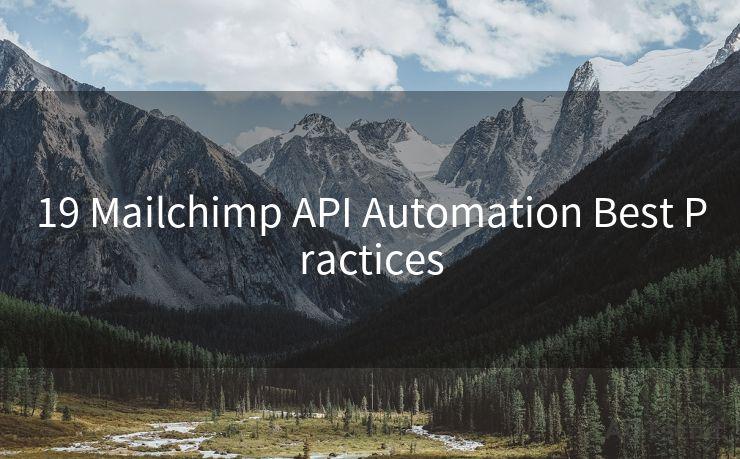19 Mailchimp API Automation Best Practices




1. Introduction to Mailchimp API Automation
In the world of email marketing, Mailchimp stands as a giant, offering robust features for businesses to connect with their audiences. Among these features, the Mailchimp API (Application Programming Interface) stands out, enabling advanced automation and integration with other systems. In this article, we'll explore 19 best practices for harnessing the power of Mailchimp's API in your automation efforts.
2. Understand the Mailchimp API Basics
Before diving into automation, it's crucial to understand the fundamentals of the Mailchimp API. Familiarize yourself with endpoints, authentication methods, and the structure of requests and responses. This knowledge will serve as a solid foundation for your automation efforts.
3. Set Clear Automation Goals
Define the specific goals you want to achieve through API automation. Whether it's improving customer engagement, driving sales, or streamlining your email marketing workflow, clarity on objectives is key.
4. Utilize the API for List Management
The Mailchimp API allows for seamless management of your subscriber lists. Automate the process of adding, updating, or removing subscribers based on specific criteria or actions taken on your website or app.
5. Segment Your Audience Dynamically
Use the API to dynamically segment your audience based on their preferences, purchase history, or engagement levels. This ensures that your emails are highly targeted and relevant, increasing their effectiveness.
6. Automate Email Campaigns

Take advantage of the API to automate your email campaigns. Schedule emails to be sent at optimal times, based on user behavior or other triggers, to maximize open and click-through rates.
7. Integrate with Third-Party Apps
The Mailchimp API's integration capabilities allow you to connect with various third-party apps. This enables you to sync data, trigger emails based on external events, and create a more holistic customer experience.
8. Monitor and Optimize Performance
Continuously monitor the performance of your automated emails through the API. Use the insights gained to refine your automation strategies, improve targeting, and boost ROI.
9. Handle Errors and Exceptions Gracefully
When working with APIs, error handling is crucial. Implement robust error-handling mechanisms to ensure that any issues with the API are caught and addressed promptly, minimizing disruptions to your automation workflows.
10. Secure Your API Credentials
Protect your API keys and access tokens. Use secure storage methods and follow best practices for managing credentials to prevent unauthorized access to your Mailchimp account.
11. Test, Test, and Test Again
Before rolling out any automation, conduct rigorous testing. This ensures that your workflows are functioning as intended and minimizes the risk of errors or unexpected behavior.
12. Leverage Webhooks for Real-Time Updates
Utilize Mailchimp's webhook functionality to receive real-time updates on subscriber activity, campaign performance, and more. This allows you to react swiftly to changes and adjust your automation strategies accordingly.
13. Stay Up to Date with API Changes
Keep abreast of any updates or changes to the Mailchimp API. This ensures that your automation remains compatible and effective as the platform evolves.
14. Optimize for Mobile
With a significant portion of emails being opened on mobile devices, ensure that your automated emails are optimized for mobile viewing. This improves user experience and engagement.
15. Personalize Content
Use the data available through the API to personalize email content. Tailored messages are more likely to resonate with recipients, leading to higher conversion rates.
16. Implement A/B Testing
Experiment with different subject lines, content, or send times using A/B testing. The Mailchimp API supports this functionality, allowing you to fine-tune your automation strategies based on actual performance data.
17. Follow Email Best Practices
Adhere to email best practices, such as maintaining a healthy sender reputation, avoiding spammy content, and using clear and compelling call-to-actions.
18. Monitor API Usage and Limits
🔔🔔🔔
【AOTsend Email API】:AOTsend is a Managed Email Service for sending transactional emails. Support Email Types: reminders, authentication, confirmations, notifications, verification codes, invoices, password resets, account activations, billing statements, two-factor authentication (2FA), and one-time passwords (OTP) emails, etc. $0.28 per 1000 Emails. 99% Delivery, 98% Inbox Rate.
You might be interested in:
Why did we start the AOTsend project, Brand Story?
What is a Managed Email API, How it Works?
Best 25+ Email Marketing Platforms (Authority,Keywords&Traffic Comparison)
Best 24+ Email Marketing Service (Price, Pros&Cons Comparison)
Email APIs vs SMTP: How they Works, Any Difference?
Keep track of your API usage to ensure you're not hitting any rate limits or quotas. This helps maintain the reliability and efficiency of your automation workflows.
19. Continuously Learn and Adapt
The world of email marketing and automation is constantly evolving. Stay updated with the latest trends, best practices, and Mailchimp API updates to ensure your automation strategies remain cutting-edge.
By following these best practices, you can harness the full potential of the Mailchimp API and take your email marketing automation to the next level. Remember, the key to successful automation lies in continuous




Scan the QR code to access on your mobile device.
Copyright notice: This article is published by AotSend. Reproduction requires attribution.
Article Link:https://www.mailwot.com/p5585.html



